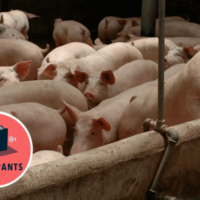-
The capitalist pandemic, Coronavirus and the economic crisis
The coronavirus pandemic is a serious public health problem and the human suffering caused by the spread of this virus will be enormous. If it massively affects countries of the Global South with very fragile public health systems that have been undermined by 40 years of neo-liberal policies, the death toll will be very high. We must not forget the critical situation of the Iranian population, victim of the blockade imposed by Washington, a blockade that includes medicines and medical equipment.
-
Capitalism is killing us. We have to destroy it
COVID-19 has challenged humanity: on what principles do you organise your society? The pandemic could have been defeated by cooperation, planning, transparency, and social solidarity. But instead, it was born into a society based on competition, secrecy, lies, and greed.
-
The rise of AI-Capitalism: An interview with Nick Dyer-Witheford
The political answer is not acceleration but refusal. And this is indeed what is has begun to manifest, in a variety of social rebellions. This includes the strikes of gig economy labor, the protests of Silicon Valley tech workers, anti-surveillance movements, urban protests against the smart city, defections from social media sites, algorithmic-bias busting, and “techlash” against the oligopolistic concentration of digital powers.
-
How global agriculture grew a pandemic
What are the underlying structural reasons for the coronavirus outbreak? According to Monthly Review Press author Rob Wallace, you have to look at global agriculture if you really want to understand the nature of global outbreaks.
-
Why sanctions against Iran and Venezuela during a pandemic are cruel
In the midst of a pandemic, one would expect all countries to collaborate; that a humanitarian crisis of this magnitude would provide ample opportunity to end (or suspend) inhumane economic sanctions. Is this not the time for the imperialist bloc, led by the U.S., to end the sanctions against Cuba, Iran, Venezuela, and a series of other countries?
-
“Capitalism is a disease hotspot”
The real danger of each new outbreak is the failure or—better put—the expedient refusal to grasp that each new Covid-19 is no isolated incident. The increased occurrence of viruses is closely linked to the proliferation of capitalist food production and distribution.
-
United States Imposed Economic Sanctions: The Big Heist
The money trail of U.S. Sanctions leads to the Federal Reserve Bank of New York, which—behind the shadow of secrecy laws that effectively prohibit any form of public accountability—facilitates the theft of public wealth from targeted countries on a scale only previously accomplished through military invasion and occupation.
-
Re-enchanting the world: Silvia Federici on feminism and the politics of the commons
In her recent volume Re-enchanting the World: Feminism and the Politics of the Commons (PM Press, 2019), Silvia Federici fruitfully brings together feminist reflections with discussions of the commons as a possible way of overcoming capitalism.
-
Money on the Left for COLA
We, the hosts of the Money on the Left podcast, write to express our solidarity with the University of California, Santa Cruz (UCSC) graduate students participating in an ongoing wildcat strike for a Cost of Living Adjustment (COLA). We extend our full support to not only the 82 UCSC graduate students who the UC administration […]
-
Lebanon is a severe case of subordinate financialization that must avoid the IMF
To me, the Lebanese crisis looks like, in the first instance, as a foreign exchange and international transactions crisis, a classic developing country crisis in the era of financialisation. As such it is closely connected to the country’s policy on the exchange rate. The fixed peg policy chosen by the Lebanese ruling class and operated by the central bank and the government for a long time, has proven destructive. The country’s economy is under great pressure because the strong pound has damaged Lebanese competitiveness on an international scale and facilitated the growth of domestic credit.
-
Coronavirus: a disaster of capitalism’s making
What to do if confronted with an extremely contagious virus that medical experts say they have not seen before and don’t understand, and which is fast spreading and killing hundreds of people? a) Take precautionary measures to stop the virus spreading and prepare the health system for a potential shock? Or b) Ignore it, blithely assert – without any evidence – that it is little different from the common flu, accuse your adversaries.
-
Digital Workerism: Technology, platforms, and the circulation of workers’ struggles
The so-called platform economy–the distribution of, and access to work through websites and apps–continues to grab headlines and the imagination of policy makers, researchers, and journalists the world over. Much attention is given to its rapid expansion, its potential for further growth, and the large amounts of wealth generated through it.
-
Beyond the Permanent State of Emergency
Not long before the Twin Towers fell, the Italian philosopher Giorgio Agamben resurrected a concept anathema to the liberal notion of progress—the idea that unrelenting crisis is not necessarily exceptional. Agamben employed the image of “the Camp” to describe the space and time “when the state of exception begins to become the rule.”
-
Capitalism, socialism and over-production crises
Unlike capitalism, socialism avoids any waste or slack, such as is caused by an over-production crisis, by raising the consumption of workers appropriately to avert it.
-
Blue Acceleration: Capitalism’s growing assault on the oceans
“A new phase in humanity’s relationship with the biosphere, where the ocean is not only crucial but is being fundamentally changed”
-
A possible Communist redefinition of love
In In Praise of Love, Alain Badiou defined love as a form of “minimal communism [where] the real subject of a love is the becoming of the couple and not the mere satisfaction of the individuals that are its component parts.”(1) Earlier in the book, Badiou provided a more elegant statement, associating the act of loving to “learn[ing] that you can experience the world on the basis of difference and not only in terms of identity.”
-
Where is the rift? Marx, Lacan, capitalism, and ecology
When, decades ago, ecology emerged as a crucial theoretical and practical issue, many Marxists (as well as critics of Marxism) noted that nature–more precisely, the exact ontological status of nature–is the one topic where even the crudest dialectical materialism has an advantage over Western Marxism.
-
Disabled people under attack
In December, Ontario’s Auditor-General, Bonnie Lysyk, issued a report that offers the province’s right wing Tory government an opportunity to attack disabled people living in poverty.
-
The Lebanese Intifada, or the growth of an anti-capitalist mass movement
Today the cow is dry. Businessmen stepped on her neck for years, extracting the last drop of milk. There is nothing left for them to fight for, except for the hopes of using us to beg either from the U.S., the E.U. or the Gulf States.
-
The climate-migration-industrial complex
Thirty years ago there were fifteen border walls around the world. Now there are seventy walls and over one billion national and international migrants. International migrants alone may even double in the next forty years due to global warming.




















